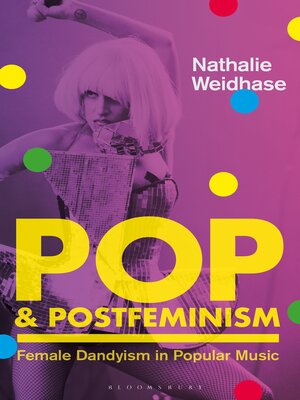Pop & Postfeminism
ebook ∣ Female Dandyism in Popular Music · Library of Gender and Popular Culture
By Nathalie Weidhase

Sign up to save your library
With an OverDrive account, you can save your favorite libraries for at-a-glance information about availability. Find out more about OverDrive accounts.
Find this title in Libby, the library reading app by OverDrive.



Search for a digital library with this title
Title found at these libraries:
| Library Name | Distance |
|---|---|
| Loading... |
Nathalie Weidhase conceptualises the female dandy as a figure that simultaneously embodies and disrupts postfeminist notions of femininity, including maintaining a physique conforming to contemporary beauty standards, constant self-surveillance and self-improvement, and the naturalisation of gender difference and heterosexuality.
She examines how music videos function as spaces in popular culture where the politics of the feminine can be articulated. These spaces allow female pop stars to be valued as artists with distinct contributions to popular music. Focusing on Amy Winehouse, Rihanna, Lady Gaga, and Lana Del Rey, Weidhase illuminates different characteristics of the postfeminist dandy in popular music. Amy Winehouse's work makes visible the commodification of the female spectacle in popular culture, highlighting how her image and persona were marketed and consumed. Rihanna performs black femininity as postfeminism's abject Other. Lady Gaga queers monstrous motherhood and celebrates female musical lineage. Lana Del Rey's work demonstrates how whiteness operates as a canvas for postfeminist and post-racial fantasies, offering a platform for their deconstruction and critique.
In doing so, Weidhase provides a comprehensive understanding of how these pop stars navigate and challenge the intricate landscape of postfeminism, offering a nuanced perspective on contemporary femininity and its representations in popular culture.
She examines how music videos function as spaces in popular culture where the politics of the feminine can be articulated. These spaces allow female pop stars to be valued as artists with distinct contributions to popular music. Focusing on Amy Winehouse, Rihanna, Lady Gaga, and Lana Del Rey, Weidhase illuminates different characteristics of the postfeminist dandy in popular music. Amy Winehouse's work makes visible the commodification of the female spectacle in popular culture, highlighting how her image and persona were marketed and consumed. Rihanna performs black femininity as postfeminism's abject Other. Lady Gaga queers monstrous motherhood and celebrates female musical lineage. Lana Del Rey's work demonstrates how whiteness operates as a canvas for postfeminist and post-racial fantasies, offering a platform for their deconstruction and critique.
In doing so, Weidhase provides a comprehensive understanding of how these pop stars navigate and challenge the intricate landscape of postfeminism, offering a nuanced perspective on contemporary femininity and its representations in popular culture.







